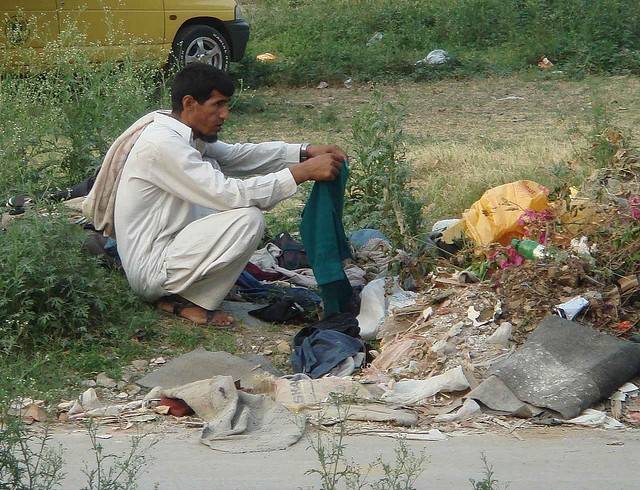Wearing a soiled white shalwar qamiz, the emaciated man stood next to the garbage dumpster, looking at our trash deciding what was worth scavenging. Another person carrying a shopping bag approached the dumpster, with fingers pinching his nose to avoid the rotting odor; he threw the bag into the trash from a distance and went back.
The other waited for the thrower to go a distance, then sat on the ground and opened up the bag.
I stopped, unable to continue past the scene, and took out my cell phone to make a video of what was going to happen, and watched, as if in slow motion, the unfolding of the saddest story I have seen in a long time. My phone slipped out of my hands.
The scavenger stood up holding a black pant, shook it to dust it off and held it against his leg. Apparently satisfied, he put one leg in the trouser – with his shalwar on – and even from a distance of a few meters, I could feel his happiness on seeing that it fit.
Quickly, his other leg went in and, straightening up, he buttoned up the waist. Bending again, he took out a shirt – which I could see was a few sizes too large for him – wore it over his qamiz and tucked both in the pants. The next dip brought a golden shawl which he draped around his neck. This was better than scavenging – he literally had a spring in his step as he walked away from the scene. Suddenly he stopped, turned around and skipped back. He picked up his scavengers bag, slung it over his shoulder, and skipped away again.
I sat – shivering as if I had a high fever – watching him till he turned round the wall of a building across the road and was gone. I rubbed my eyes, reflecting if I had seen a dream, a phantom, a film, a vision, or a real-life happening. But the reality of it was all too real and too recent to be anything but the truth.
I looked down to see what was burdening my lap, and saw the cell phone, camera still on.
All of this took less time to happen, than it has taken me to write or for you to read; and that is the story. Everything takes less time to happen than it takes to narrate.
The same evening, I went for a wedding. As the guests arrived bedecked in the finest clothes and jewelry; the brand new unregistered City for the bride's dowry; the generator running to keep the lights on while the city around had electricity outage. The cold feeling of the afternoon came back and sat uneasily in my stomach.
Each of the guests, male and female, were wearing clothes the price of which I knew was more than the scavenger would need to run his ram shackled abode for a month.
My thoughts turned to the raves and rants, candle light vigils, marches for a cause, fund raising events, scrambles for press coverage, loud voices and noises emanating from NGOs and the ‘civil society,’ one or the other movement. Members of all these groups were at the wedding, all wearing the best finery!
A question struggled to the surface: who is responsible for the welfare of that scavenger and others like him? If, indeed, there is such a thing as “welfare” in today’s highly urbanized status-centric society, and interest-aligned politics.
Is it the responsibility of the state? Going by the book: welfare, education, health, currency, communication infrastructure, foreign policy, defense, internal security, policing, equitable distribution of resources, etc., are not the NGOs’ or civil society’s responsibilities, they are the government’s.
Yes the NGOs and civil society have a role in maintaining open exchanges, as it is the job of the opposition in the Parliament to raise issues affecting their legislative mandate. But these exchanges are mostly high on rhetoric invoking religion and stories of the caliph stopped from leading a prayer to answer how he made a full shirt while the populace got only half a piece from the spoils of war; and of being as answerable to God as the caliph who wept thinking what answer he would have on the day of judgement if a dog slept hungry, more than a thousand miles away. And while speaking of this, we conveniently forget that the same caliph was lying under the shade of a date palm when someone nudged him to ask where the caliph would be found, and got the answer, “right here”. While we use multi cars convoys as a decoy to confuse which carries the “laat saab,” we talk of arriving at Constantinople with the slave riding the camel?
And we also conveniently forget, most importantly, that all of this is at the expense of that scavenger whose toil, at the bottom rung of the monetary pyramid, fuels the economy.
But then these are not caliphs, these are democratically elected “rulers” of the people who voted to elect them to “lead” them out of the miseries of the hovels of life!






